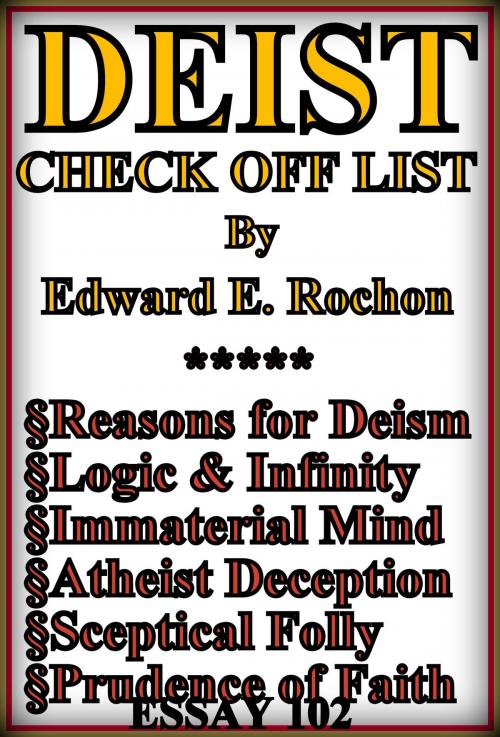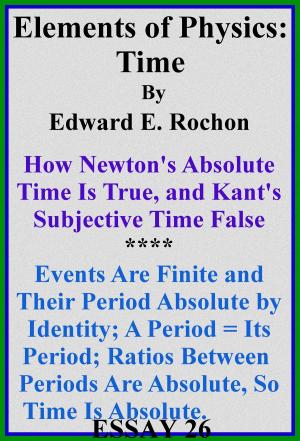| Author: | Edward E. Rochon | ISBN: | 9781370934461 |
| Publisher: | Edward E. Rochon | Publication: | September 1, 2016 |
| Imprint: | Smashwords Edition | Language: | English |
| Author: | Edward E. Rochon |
| ISBN: | 9781370934461 |
| Publisher: | Edward E. Rochon |
| Publication: | September 1, 2016 |
| Imprint: | Smashwords Edition |
| Language: | English |
A brief preface describes the scope of the work. We note the difference between the physical world and the metaphysical world. I go on to mathematical forms to show that the finite and infinite coexist, that the infinite conforms to deist notions. It goes on to show that the evidence supports what most men have accepted throughout history, that consciousness is immaterial and in conformance with the evidence, both empirical and logical. Next, note that an immaterial mind could be seen as both within and without the body, conforming to solipsism in outward form while still affirming the material world. I even bring Jean-Paul Sartre to bear to suggest that consciousness can logically be seen to exist outside the brain by common perception and reasonable assertions. I forcefully advance the evidence that ideas must be independent of the things they describe and so more evidence of immateriality and so of God. We attack David Hume, Bishop Berkeley and John Locke in several ways. I go on to show that scepticism is a foolish path as opposed to faith. A man of faith is less prone to delusion, irrational motivations than a sceptic, that in fact scepticism is not founded on logic, or moral courage, but only on stupidity and cowardice. We note that Christianity cannot be shown to justify defeatism, acceptance of evil, poverty or superstitious opinions in this world. In answer to atheist charges that faith is motivated by wishful thinking, ignorance and the like, I point out the many reasons why atheism can be comforting to many people for otherwise irrational or at any rate unprovable reasons. Using other supports, we assert there are three basic linguistic modes. In addition to the literal and metaphorical, we posit a metaphysical mode. This last mode is forced to use concrete imagery from nature due to the indefinable nature of the immaterial. The metaphor uses other concrete images to poetically describe other concrete things and events, while the writer would still be able to use literal prose. But metaphysical language has no such option. The concrete must be used of necessity to describe what is indefinable. The speaker must rely on the human capacity to grasp the indefinable. It is observed that polytheism helps lay a middle ground in dealing with the problem of evil as in the Book of Job. Gods are more like men and easier to comprehend and dicker with. A transcendent God makes the suffering of Job harder to understand. Atheism is hard to support by reason, so polytheism has often been a middle course. The next part deals with the accusation that Deism promotes evil. I note the recent atheist regimes have committed horrendous crime under the pretext of their ideologies in France, Russia, China, North Korea, and Cambodia. I note that lust is the cause of evil that deludes the mind to justify it, so am sceptical of the notion that belief in God is necessary to directly promote ethical behavior. My view is that affirmation of Deism is necessary to promote truth in life, science and art, and so indirectly promoting good through that avenue. My work ends with a brief summary of my main points. Several areas covered by me previously in support of Deism are omitted other than by brief mention.
A brief preface describes the scope of the work. We note the difference between the physical world and the metaphysical world. I go on to mathematical forms to show that the finite and infinite coexist, that the infinite conforms to deist notions. It goes on to show that the evidence supports what most men have accepted throughout history, that consciousness is immaterial and in conformance with the evidence, both empirical and logical. Next, note that an immaterial mind could be seen as both within and without the body, conforming to solipsism in outward form while still affirming the material world. I even bring Jean-Paul Sartre to bear to suggest that consciousness can logically be seen to exist outside the brain by common perception and reasonable assertions. I forcefully advance the evidence that ideas must be independent of the things they describe and so more evidence of immateriality and so of God. We attack David Hume, Bishop Berkeley and John Locke in several ways. I go on to show that scepticism is a foolish path as opposed to faith. A man of faith is less prone to delusion, irrational motivations than a sceptic, that in fact scepticism is not founded on logic, or moral courage, but only on stupidity and cowardice. We note that Christianity cannot be shown to justify defeatism, acceptance of evil, poverty or superstitious opinions in this world. In answer to atheist charges that faith is motivated by wishful thinking, ignorance and the like, I point out the many reasons why atheism can be comforting to many people for otherwise irrational or at any rate unprovable reasons. Using other supports, we assert there are three basic linguistic modes. In addition to the literal and metaphorical, we posit a metaphysical mode. This last mode is forced to use concrete imagery from nature due to the indefinable nature of the immaterial. The metaphor uses other concrete images to poetically describe other concrete things and events, while the writer would still be able to use literal prose. But metaphysical language has no such option. The concrete must be used of necessity to describe what is indefinable. The speaker must rely on the human capacity to grasp the indefinable. It is observed that polytheism helps lay a middle ground in dealing with the problem of evil as in the Book of Job. Gods are more like men and easier to comprehend and dicker with. A transcendent God makes the suffering of Job harder to understand. Atheism is hard to support by reason, so polytheism has often been a middle course. The next part deals with the accusation that Deism promotes evil. I note the recent atheist regimes have committed horrendous crime under the pretext of their ideologies in France, Russia, China, North Korea, and Cambodia. I note that lust is the cause of evil that deludes the mind to justify it, so am sceptical of the notion that belief in God is necessary to directly promote ethical behavior. My view is that affirmation of Deism is necessary to promote truth in life, science and art, and so indirectly promoting good through that avenue. My work ends with a brief summary of my main points. Several areas covered by me previously in support of Deism are omitted other than by brief mention.















